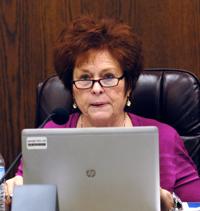PHOENIX — Unable to push through a cap on university tuition hikes to control costs, a state lawmaker wants to require universities to offer a “stripped-down” degree.
Sen. Sylvia Allen, R-Snowflake, acknowledged Wednesday she cannot marshal the votes for her plan to limit year-over-year tuition increases to 2 percent. SB 1061 drew stiff opposition from the Board of Regents, which contends higher tuition is related to the cuts in state funding enacted by the Republican-controlled Legislature.
But Allen, who chairs the Senate Education Committee, said she is now crafting other ways to cut the cost of higher education.
One of those is requiring universities to provide programs in which students only need to take the courses necessary to gain a particular skill set.
“They make them take a lot of classes that have nothing to do with the degree they’re trying to get,” Allen said. “They could tighten that up a little bit so that there’s less time at the university taking courses that don’t necessarily apply to what it is you’re trying to get your degree for.”
So, for example, a student wanting a degree in journalism might need only 36 hours of journalism courses and perhaps some courses in English and political science. But much of the rest that fills out the 120 hours needed for a bachelor’s degree, ranging from foreign language skills to math courses, would be optional.
Universities’ position has been that a liberal arts education leads to a well-rounded individual.
“I’ve heard the arguments,” Allen said. But she said she’s not convinced that’s appropriate for everyone.
“I believe that a student should choose,” she said. If they want the “well-rounded (degree), great. But if a student wants to fast-track to be able to get a degree in journalism, that should be offered.”
Offering such a program would be another way to make higher education more affordable, she said.
Allen said she doesn’t intend for such a degree option to trick students or their potential future employers. The degree would say that only minimally required courses were taken, and that it’s not a full-blown liberal arts degree, she said.
She’s not convinced, she added, that the academic courses make someone skilled in a profession.
There was no immediate response from Eileen Klein, president of the Arizona Board of Regents.
Despite Allen’s inability to get the 2 percent cap on tuition increases, she is pursuing other options this legislative session.
One issue, she said, is that it’s not fair for a student who enters school to be priced out because of a sudden increase.
Two of the state’s three universities have some form of a tuition guarantee. But she said legislative testimony shows these are flawed because they fail to include a host of non-optional fees, including special charges for classes a student is required to take.
She is now rewriting her proposal to make the guarantee more inclusive. No date has been set for a new hearing.




